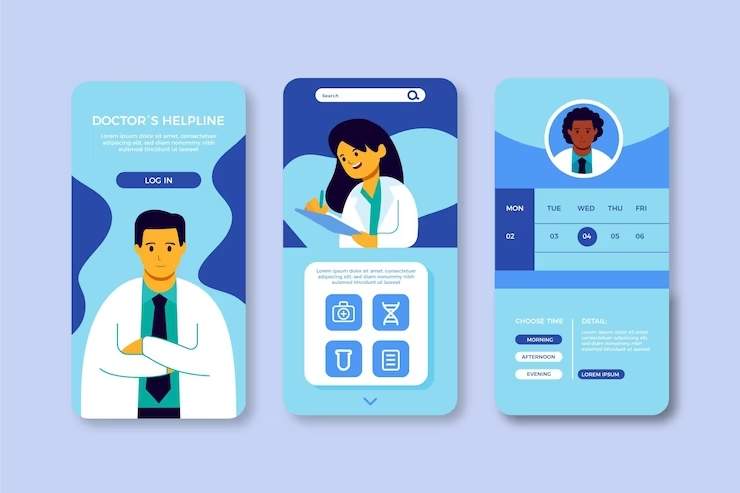
Medical App Ideas for Healthcare Startups: Enhancing Care Through Technology

Introduction
In the rapidly evolving healthcare industry, technology has become a key enabler, revolutionizing the way medical services are provided to patients. Healthcare startups are at the forefront of this transformation, harnessing the potential of mobile applications to offer innovative solutions that enhance patient care and accessibility. Through collaboration with healthcare app development services, startups can bring cutting-edge medical app ideas to life, creating a significant impact in the industry. This article explores unique and groundbreaking medical app ideas that have the potential to empower startups and shape the future of healthcare.
- Augmented Reality (AR) for Surgical Training
Incorporating augmented reality technology into medical apps can revolutionize surgical training and education. Startups can develop apps that provide aspiring surgeons with immersive simulations of complex surgical procedures. These AR-driven apps can allow users to practice surgical techniques in a safe and controlled environment, improving their skills and confidence before performing surgeries on real patients. By bridging the gap between theoretical learning and hands-on experience, AR-based surgical training apps have the potential to enhance surgical outcomes and reduce medical errors.
- Personalized Nutrition and Dietary Management
Nutrition plays a vital role in overall health and well-being. Startups can create medical apps that use artificial intelligence to analyze users’ dietary preferences, health conditions, and fitness goals to provide personalized nutrition plans. These apps can track users’ eating habits, suggest healthy recipes, and offer real-time nutritional advice based on their unique needs. By promoting healthy eating habits and empowering users to make informed choices, these apps can combat obesity and diet-related diseases.
- Virtual Reality (VR) Therapy for Pain Management
Chronic pain is a significant healthcare challenge that affects millions of people worldwide. Medical startups can design VR therapy apps to help patients manage pain and improve their quality of life. By immersing patients in calming and distracting virtual environments, these apps can alleviate pain perception and reduce the reliance on pain medications. Moreover, VR therapy can be used to manage anxiety and stress, making it a versatile tool for mental health support.
- AI-powered Medical Imaging Analysis
Interpreting medical imaging, such as X-rays and MRIs, can be time-consuming and prone to human error. Healthcare startups can develop AI-driven medical imaging analysis apps that assist healthcare professionals in diagnosing conditions accurately. By leveraging machine learning algorithms, these apps can quickly analyze medical images, detect abnormalities, and provide preliminary diagnostic insights. This can significantly improve the efficiency of radiologists and other specialists, leading to faster diagnosis and treatment.
- Elderly Care and Remote Monitoring
Caring for the elderly, especially those with chronic illnesses, can be challenging, particularly when they live alone. Startups can create medical apps that focus on elderly care and remote monitoring. These apps can connect seniors with caregivers or family members, allowing them to share vital signs, medication schedules, and other health data in real-time. This remote monitoring can help identify health issues early, prevent emergencies, and enhance the overall quality of care for the elderly population.
- Allergy and Food Intolerance Management
Living with allergies and food intolerances requires careful management of dietary choices. Healthcare startups can develop apps that help users identify allergens in food products by scanning barcodes or taking pictures. These apps can also offer personalized meal plans, restaurant recommendations, and emergency response instructions in case of accidental exposure. By empowering users to navigate their dietary restrictions more effectively, these apps can improve their quality of life and reduce the risk of severe allergic reactions.
- Virtual Reality Exposure Therapy for Mental Health
Virtual reality exposure therapy is a powerful tool for treating various mental health conditions, such as phobias, post-traumatic stress disorder (PTSD), and anxiety disorders. Startups can create apps that provide users with controlled and immersive virtual environments to confront their fears and anxieties safely. These apps can be used in conjunction with professional therapy or as standalone tools for mental health support. Virtual reality exposure therapy has shown promising results in desensitizing individuals to triggering stimuli, leading to better mental health outcomes.
Conclusion
Healthcare startups are ushering in a new era of medical innovation through mobile app solutions that address pressing healthcare challenges. The medical app ideas presented in this article demonstrate the immense potential for technology to transform patient care, accessibility, and overall well-being. By staying at the forefront of technological advancements and collaborating with expert healthcare app development services, startups can create groundbreaking solutions that revolutionize healthcare and improve lives globally. The future of healthcare is bright, with technology-driven medical apps paving the way for a healthier and more connected world.
Introduction
In the rapidly evolving healthcare industry, technology has become a key enabler, revolutionizing the way medical services are provided to patients. Healthcare startups are at the forefront of this transformation, harnessing the potential of mobile applications to offer innovative solutions that enhance patient care and accessibility. Through collaboration with healthcare app development services, startups can bring cutting-edge medical app ideas to life, creating a significant impact in the industry. This article explores unique and groundbreaking medical app ideas that have the potential to empower startups and shape the future of healthcare.
Augmented Reality (AR) for Surgical Training
Incorporating augmented reality technology into medical apps can revolutionize surgical training and education. Startups can develop apps that provide aspiring surgeons with immersive simulations of complex surgical procedures. These AR-driven apps can allow users to practice surgical techniques in a safe and controlled environment, improving their skills and confidence before performing surgeries on real patients. By bridging the gap between theoretical learning and hands-on experience, AR-based surgical training apps have the potential to enhance surgical outcomes and reduce medical errors.
Personalized Nutrition and Dietary Management
Nutrition plays a vital role in overall health and well-being. Startups can create medical apps that use artificial intelligence to analyze users’ dietary preferences, health conditions, and fitness goals to provide personalized nutrition plans. These apps can track users’ eating habits, suggest healthy recipes, and offer real-time nutritional advice based on their unique needs. By promoting healthy eating habits and empowering users to make informed choices, these apps can combat obesity and diet-related diseases.
Virtual Reality (VR) Therapy for Pain Management
Chronic pain is a significant healthcare challenge that affects millions of people worldwide. Medical startups can design VR therapy apps to help patients manage pain and improve their quality of life. By immersing patients in calming and distracting virtual environments, these apps can alleviate pain perception and reduce the reliance on pain medications. Moreover, VR therapy can be used to manage anxiety and stress, making it a versatile tool for mental health support.
AI-powered Medical Imaging Analysis
Interpreting medical imaging, such as X-rays and MRIs, can be time-consuming and prone to human error. Healthcare startups can develop AI-driven medical imaging analysis apps that assist healthcare professionals in diagnosing conditions accurately. By leveraging machine learning algorithms, these apps can quickly analyze medical images, detect abnormalities, and provide preliminary diagnostic insights. This can significantly improve the efficiency of radiologists and other specialists, leading to faster diagnosis and treatment.
Elderly Care and Remote Monitoring
Caring for the elderly, especially those with chronic illnesses, can be challenging, particularly when they live alone. Startups can create medical apps that focus on elderly care and remote monitoring. These apps can connect seniors with caregivers or family members, allowing them to share vital signs, medication schedules, and other health data in real-time. This remote monitoring can help identify health issues early, prevent emergencies, and enhance the overall quality of care for the elderly population.
Allergy and Food Intolerance Management
Living with allergies and food intolerances requires careful management of dietary choices. Healthcare startups can develop apps that help users identify allergens in food products by scanning barcodes or taking pictures. These apps can also offer personalized meal plans, restaurant recommendations, and emergency response instructions in case of accidental exposure. By empowering users to navigate their dietary restrictions more effectively, these apps can improve their quality of life and reduce the risk of severe allergic reactions.
Virtual Reality Exposure Therapy for Mental Health
Virtual reality exposure therapy is a powerful tool for treating various mental health conditions, such as phobias, post-traumatic stress disorder (PTSD), and anxiety disorders. Startups can create apps that provide users with controlled and immersive virtual environments to confront their fears and anxieties safely. These apps can be used in conjunction with professional therapy or as standalone tools for mental health support. Virtual reality exposure therapy has shown promising results in desensitizing individuals to triggering stimuli, leading to better mental health outcomes.
Conclusion
Healthcare startups are ushering in a new era of medical innovation through mobile app solutions that address pressing healthcare challenges. The medical app ideas presented in this article demonstrate the immense potential for technology to transform patient care, accessibility, and overall well-being. By staying at the forefront of technological advancements and collaborating with expert healthcare app development services, startups can create groundbreaking solutions that revolutionize healthcare and improve lives globally. The future of healthcare is bright, with technology-driven medical apps paving the way for a healthier and more connected world.















